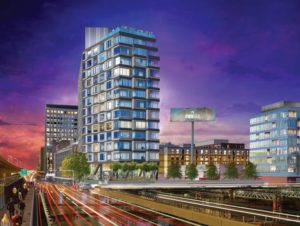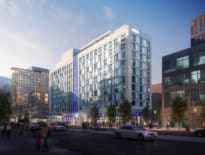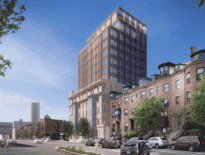
National Development’s 7INK by Ollie project at 217 Albany St. in South End is expected to offer 327 individually leased bedrooms in a 14-story tower.
The Boston area hosts excellent hospitals, technology firms and prominent universities. These institutions attract healthcare professionals, hospital patients, scientists, engineers, academics and graduate students from around the world, many of whom associate with businesses or institutions on a temporary basis. Often these individuals are reluctant to take on the expense, commitment, and isolation related to living alone in a home, apartment or hotel. Co-living projects can be an attractive alternative for such people.
Typical co-living projects look like apartment buildings, while offering amenities found in hotels. Unrelated residents have exclusive use of separately keyed bedrooms, but they share kitchens, bathrooms and common living areas. Co-living projects often include concierges, meeting areas and fitness rooms.
Boston Attractive for Operators
At least two co-living developments are now on the drawing board in Boston. National Development plans to open Boston’s first major co-living project in the South End’s Ink Block in 2021. The project, known as 7INK by Ollie, is expected to offer 327 individually leased bedrooms in a 14-story building. Last March, Boylston Properties and ARX Urban announced plans for a six-story project in Allston with 80 dwelling units, some of which are expected to be used for co-living.
Medici Living Group, the largest co-living operator in Europe, provides co-living housing for almost 300 residents in the U.S. and is eyeing the Boston area.
“The Boston area – particularly Somerville and South Boston – are important target markets for Quarters,” said Mark Smith, the general manager of U.S. operations for Medici’s Quarters co-living brand. “Both cities have high numbers of young college graduates that start their careers there. Our higher density format provides housing affordability and an instant community – key priorities for young professionals. Real estate developers appreciate our 10-year master lease structure, as it allows them to minimize vacancy risk.”
An Unclear Use Under Boston Zoning
While the Boston market holds interest for co-living project operators, the city presents challenges from a regulatory perspective. Boston’s zoning code is complicated, with many neighborhoods, in effect, having their own zoning ordinances. It also establishes several overlay districts with special regulations on everything from public parking to groundwater protection.
It is unclear how to assign co-living arrangements to a “use” defined under Boston’s zoning code. Co-living is residential in nature, but has aspects commonly associated with hotels and lodging houses. The Boston zoning code defines the term “lodging house” as any dwelling (excluding dormitories, fraternity and sorority houses, and hotels) leased to five or more unrelated persons who do not have equal rights to the entire dwelling, and who are not living as a single housekeeping unit. Co-living projects seem to fall within this definition.
Boston has adopted an inclusionary development policy for residential projects having 10 or more dwelling units. This policy requires developers who need zoning relief – which is necessary for pretty much every project in Boston – to provide price-controlled affordable housing, or to make generous payments to an affordable housing fund.
The affordable housing requirements vary, depending on the neighborhood. Requirements for projects in Beacon Hill, Back Bay and Downtown are the most onerous, while requirements for Dorchester, Roxbury and most of East Boston are more lenient but still burdensome. Developers of co-living projects will be expected to adhere to Boston’s inclusionary zoning policy.

Christopher R. Vaccaro
Short-Term Rental Rules a Concern
Another concern is Boston’s new short-term residential rental ordinance, which applies to residential rentals of less than 28 days. This law severely restricts short-term housing arrangements, such as those offered through Airbnb. To steer clear of this ordinance, co-living project operators will want their residents to commit for lease terms of at least 28 days.
Finally, any co-living project must observe the Massachusetts lodging house act, which requires lodging house operators to secure licenses for their properties. This law has been around for over 100 years and was enacted to prevent “immoral solicitation, immoral bargaining or immoral conduct” at lodging houses. Legitimate co-living project operators should not have difficulties securing lodging house licenses.
Co-living projects show potential as a creative housing option, but they are still untested in the Boston area. It remains to be seen whether they can succeed in the local economic and regulatory environment.
Christopher R. Vaccaro, Esq. is a partner at Dalton & Finegold, L.L.P. in Andover. His email address is cvaccaro@dfllp.com.




 |
| 

